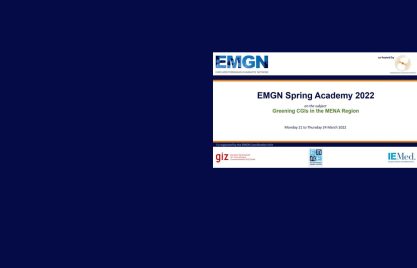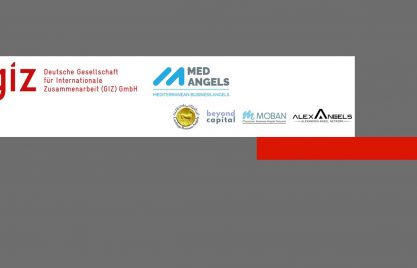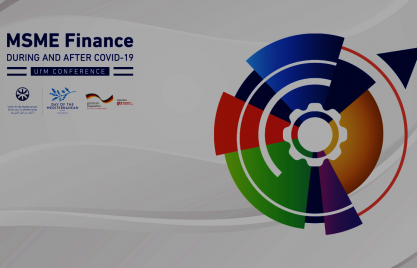The serious damage to economies and societies caused by the SARS-CoV-2 pandemic, which has had a particularly severe economic impact on MSMEs, entrepreneurs and the self-employed in the Mediterranean region, must be overcome to ensure that the socio-economic impact of the pandemic will not be felt for years to come. This will require targeted efforts to achieve sustainable economic growth, accelerate decent job creation and support the most vulnerable members of society. This is precisely where the UfM conference on MSME finance during and after COVID-19 entitled “Resilience and Innovation in the wake of COVID-19”, jointly organised by the Union for the Mediterranean (UfM) and the Deutsche Gesellschaft für Internationale Zusammenarbeit (GIZ), came in.
Background to the general duty to act
In the MENA region, MSMEs account for 80-90% of enterprises and a high share of total employment (IFC 2017). In total, formal and informal MSMEs are estimated to number between 19 and 23 million enterprises. On average, formal jobs in MSMEs contribute to less than one-fifth of total employment in the region, while informal jobs are estimated to account for 68%. Accordingly, the promotion of MSMEs and entrepreneurship has been considered an important policy tool over the last two decades to address key challenges such as reducing unemployment and increasing innovation and productivity (OECD 2020).
But even before the so-called COVID-19 pandemic, the lack of jobs was a major challenge for many Mediterranean countries. In 2018, given the demographic trend, the World Bank estimated that a total of 300 million new jobs (meaning 10 million per year or 800,000 per month) would need to be created in the MENA region by 2050 just to keep up with the new labour force entering the market (World Bank 2021; Middle East Monitor 2018).
However, the loss of at least 225 million full-time jobs globally in 2020 is rather a reversal of development efforts and runs counter to the development policy rhetoric that SMEs drive growth, create jobs, contribute to product innovation and improve the competitive landscape. Moreover, this labour market crisis is projected not to be neutralised in terms of employment rates until at least 2023, ultimately undoing five years of progress in eradicating working poverty (ILO 2021).
To address potentially long-term negative consequences such as larger informal economies, higher unemployment, greater poverty and exacerbated social inequality, rhetoric must be turned into purposeful action and various barriers that limit the socio-economic potential of MSMEs and entrepreneurship must be overcome or torn down (WEF 2017).
Context, content and purpose of the UfM Conference on MSME Finance
Lack of access to finance is one of the biggest hurdles for MSMEs to flourish, especially in many Mediterranean countries. In the MENA region, for example, 63% of MSMEs lack access to finance, with the total financing gap estimated at USD 210-240 billion and that of formal MSME financing at USD 160-180 billion. Only 8% of lending across the region is to SMEs. In the GCC countries, the figure is as low as 2%. For comparison, the average is 18% in middle-income countries and 22% in high-income countries (IFC 2017).
Against this backdrop, the UfM conference covered three main topics regarding MSME financing, each of which was shed light on and discussed in a panel by correspondingly high-calibre speakers and moderators:
(P1) The Impact of the SARS-CoV-2 pandemic on MSMEs and start-ups, and on financial service providers. With regard to the latter, this panel had a special focus on the importance of credit guarantee institutions (CGIs) and business angel investments for MSME and start-up financing, as well as the challenges to be overcome and the necessary changes needed to actually meet the needs of MSMEs and start-ups. The complexity of the challenges that need to be addressed in order to adequately support MSMEs in the region became even more apparent as structural barriers outside of financial policy fields of action were also highlighted.
(P2) The use of technology in MSME financing to build back better. Contrary to what one might expect, this panel did not revolve around ubiquitous prophecy mantras regarding the future of finance such as bitcoin, blockchain, distributed ledger technology or the like. In contrast, the panellists highlighted the key needs for building an initially sufficient digital financial infrastructure, the importance of trial-and-error methods for the emergence of adequate financial regulation, and the need for regionally harmonised regulatory frameworks to accelerate the scaling of enabling fintech solutions and necessary comprehensive data aggregation. In addition, the critical issue of access to and use of data was debated with a view to innovative business models and practices as well as financial services development.
(P3) The role of Sustainable Finance to build back better. The focus of this panel was more multi-faceted than the term Sustainable Finance suggests. Besides insights into the sustainability strategies and objectives of the EU and EIB, the contentious question of whether and, if so, how SME and inclusive finance approaches can be integrated into the vision of “greening the financial system”, was a focal point of discussion. Accordingly, the topics ranged from regulation, market infrastructure, product development, credit risk guarantees, fintech, to technical assistance, capacity building and the question of whether we have actually already made the necessary mind shift to make this vision a reality at all and, above all, in due time.
The insightful and multi-faceted, highly practical and to the necessary extent critical discussions of the distinguished experts and moderators filled the virtual UfM conference in an impressive and momentum-building way. Numerous ways were outlined on how to support MSMEs to move into a sustainable economic recovery phase and how to approach the transition to digital and greener economies in the Mediterranean. A variety of innovative solutions and approaches to the diverse areas of action were presented and discussed, which are promising for the successful promotion of MSMEs and start-ups in the context of a rapidly changing environment.
Accordingly, the panellists are likely to have contributed significantly to the overall objective of the conference, which is to encourage countries to develop a more enabling (regional) environment to adequately address the needs of MSMEs and thus ultimately those of the countries themselves.
Key Takeaways and Insights from the UfM Conference
With this in mind, we simply recommend and invite you to activate the following link and read the extremely informative outcome document of the UfM conference. Just find out what exactly matters!
By Sebastian Kausemann



